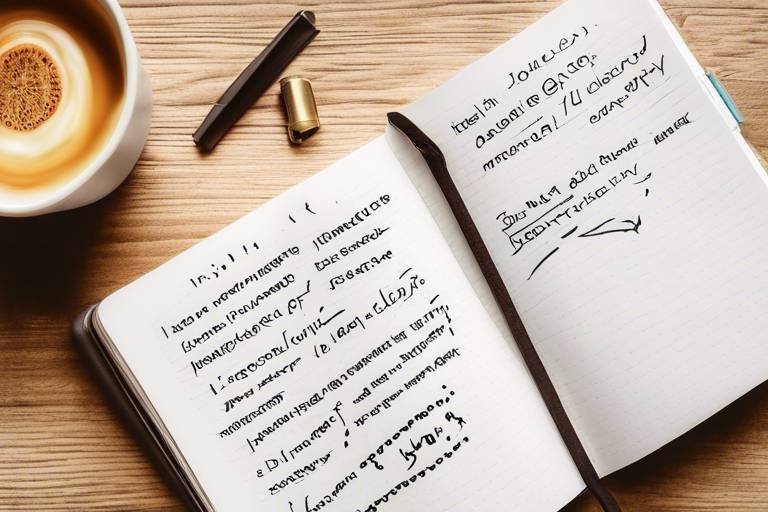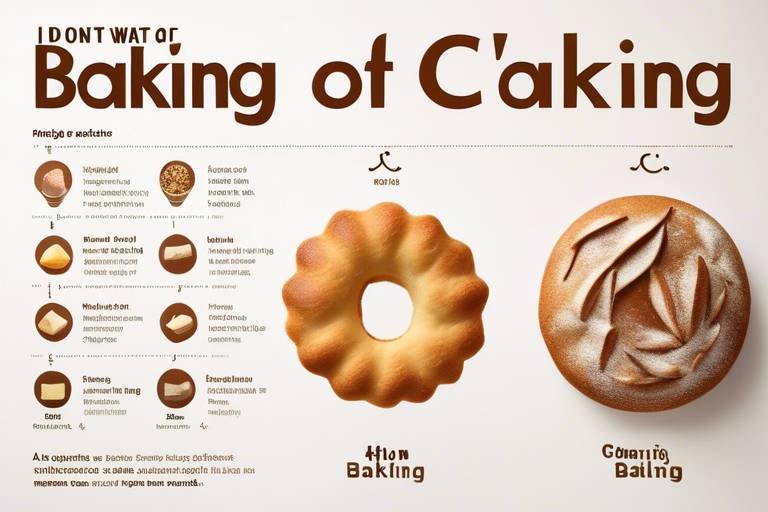The Science of Journaling - Benefits for Mental Clarity
Have you ever felt overwhelmed by your thoughts, as if your mind is a chaotic storm of ideas and emotions? If so, you’re not alone. Many people experience this mental clutter, and it can be incredibly challenging to navigate through it. This is where journaling comes into play. Journaling is more than just putting pen to paper; it’s a powerful tool that can significantly enhance your mental clarity, emotional well-being, and cognitive function. By regularly engaging in this practice, you can unlock a treasure trove of psychological benefits that not only help you process your emotions but also provide insights into your thoughts and behaviors.
Imagine your mind as a cluttered room filled with scattered papers, forgotten memories, and unresolved feelings. Journaling acts as a broom, sweeping away the dust and debris, allowing you to see the space more clearly. When you write down your thoughts, you give them a tangible form, which can help you understand and organize them better. This process can lead to a sense of relief, as if you’ve decluttered your mental space, making room for new ideas and perspectives. In this article, we will explore the various benefits of journaling, the different types of journaling methods you can adopt, and practical tips for incorporating this beneficial practice into your daily life.
So, why does journaling work? The answer lies in its ability to foster a deeper connection with ourselves. When we write, we engage in a dialogue with our inner selves, allowing us to articulate feelings we might otherwise suppress. This act of expression can be incredibly cathartic. Research has shown that expressive writing can lead to significant reductions in stress and anxiety, making it a valuable tool for anyone looking to improve their mental health. By regularly reflecting on our thoughts and emotions through journaling, we can gain insights that lead to personal growth and a clearer understanding of our life’s direction.
In summary, the science of journaling reveals its profound impact on mental clarity and emotional health. Whether you’re looking to process complex feelings, enhance your cognitive functions, or simply find a moment of peace in your busy life, journaling can be a game-changer. So grab a notebook, find a comfortable spot, and let your thoughts flow. You might just be surprised at the clarity and insights that await you on the pages of your journal.

The Psychological Benefits of Journaling
Journaling is more than just putting pen to paper; it's a powerful therapeutic tool that can significantly enhance your mental well-being. Have you ever felt overwhelmed by your thoughts, emotions, or daily stressors? You're not alone! Many people find that journaling acts as a safe haven, a space where they can freely express their feelings without fear of judgment. This practice not only provides a release for pent-up emotions but also allows individuals to process their thoughts more effectively, leading to improved emotional clarity.
Research has shown that engaging in regular journaling can alleviate symptoms of stress and anxiety. When you write about your day, your feelings, or your worries, you're essentially taking a step back and examining them from a different angle. This reflective practice can help you identify patterns in your behavior and thought processes, making it easier to understand the root causes of your stress. It's like holding a mirror up to your mind, revealing insights that may have been obscured by the chaos of everyday life.
Moreover, journaling can enhance your emotional intelligence. By regularly articulating your thoughts and feelings, you become more in tune with your emotional state. This heightened awareness can lead to better decision-making and improved relationships, as you learn to communicate more effectively with others. It's fascinating how a simple act of writing can pave the way for deeper understanding—not just of yourself, but of those around you.
One of the most compelling aspects of journaling is its ability to foster resilience. Life is full of ups and downs, and journaling can serve as a coping mechanism during challenging times. By documenting your experiences, you create a narrative that helps you make sense of your struggles. This process can empower you to view obstacles as opportunities for growth. In essence, journaling transforms your challenges into stepping stones on your journey toward personal development.
To illustrate the psychological benefits of journaling, let’s take a look at some key advantages:
- Stress Reduction: Writing about your feelings can help reduce tension and anxiety.
- Emotional Processing: Journaling encourages you to articulate and process your emotions, leading to improved mental clarity.
- Enhanced Self-Awareness: Regular writing fosters a deeper understanding of your thoughts and feelings.
- Improved Resilience: Documenting challenges helps you build coping strategies and resilience.
In conclusion, the psychological benefits of journaling are profound and far-reaching. It’s not just about recording your daily events; it’s about creating a dialogue with yourself that promotes healing, understanding, and growth. So, why not grab a notebook and start your journey today? You might be surprised at what you discover about yourself along the way!
1. How often should I journal to see benefits?
There’s no set rule, but consistency is key! Aim for a few times a week to start, and adjust based on what feels right for you.
2. What should I write about?
Write about anything that comes to mind! Your feelings, daily experiences, goals, or even a stream of consciousness can be great starting points.
3. Can journaling really help with anxiety?
Absolutely! Many studies have shown that expressing your thoughts and feelings through writing can significantly reduce anxiety levels.
4. Do I need a special journal?
Nope! Any notebook or even a digital platform will do. The important part is that it feels comfortable for you.

Journaling is not a one-size-fits-all practice; it comes in various forms, each tailored to meet different emotional and cognitive needs. Whether you're seeking a way to express your thoughts, cultivate gratitude, or organize your life, there's a journaling method that can resonate with you. Let's dive into some of the most popular types of journaling that can enhance your mental clarity and overall well-being.
One of the most profound forms of journaling is expressive writing. This technique encourages individuals to pour their thoughts and feelings onto the page without any constraints. Imagine it as a mental detox; when you let your emotions flow freely, you can achieve a greater sense of relief and clarity. It's like shaking a snow globe—once you stop shaking, the snow settles, allowing you to see things more clearly. Expressive writing not only helps in processing emotions but also enhances emotional intelligence, making it easier to navigate life's challenges.
Another popular method is gratitude journaling. This approach shifts your focus from what’s lacking in your life to the abundance that already exists. By jotting down things you are grateful for, you train your mind to recognize the positives, no matter how small. It’s like putting on a pair of rose-colored glasses; suddenly, the world seems brighter. Research shows that practicing gratitude can significantly improve your mood and overall mental health, making it a powerful tool in your journaling arsenal.
Then, we have bullet journaling, which combines organization with creativity. This method is perfect for those who thrive on structure yet want to express their individuality. Bullet journals can include to-do lists, habit trackers, and even artistic doodles, making them a versatile option for both planning and self-expression. Think of it as a customizable planner that not only helps you keep track of your tasks but also allows for personal reflection. The beauty of bullet journaling lies in its flexibility; you can adapt it to fit your unique lifestyle and preferences.
Each type of journaling offers distinct benefits, and you might find that a combination of these methods works best for you. For instance, you could start your day with gratitude journaling to set a positive tone, then switch to expressive writing in the evening to process your thoughts. The key is to experiment and find what resonates with you, unlocking the full potential of journaling as a tool for mental clarity and emotional well-being.

Expressive writing is more than just scribbling down thoughts; it's a profound method for individuals to articulate their innermost feelings and thoughts. Imagine your mind as a cluttered attic, filled with boxes and memories stacked high. Each box represents an emotion or experience, and until you open them, the chaos remains. Expressive writing serves as the key that unlocks these boxes, allowing you to confront and process your emotions. This practice can lead to significant improvements in emotional well-being, as it encourages catharsis and clarity.
When you engage in expressive writing, you're not just writing for the sake of it; you're actively participating in a dialogue with yourself. This form of writing can help you:
- Process Emotions: By putting your feelings into words, you can better understand and navigate through them.
- Gain Insight: Expressive writing allows you to reflect on your thoughts, leading to greater self-awareness and insight into your behaviors.
- Reduce Stress: Writing about your feelings can be a powerful stress-reliever, helping to alleviate anxiety and tension.
Studies have shown that individuals who practice expressive writing regularly report feeling lighter and more at ease. The act of writing can often bring about a sense of relief, as if a heavy weight has been lifted off your shoulders. It's like having a trusted friend who listens without judgment, allowing you to spill your thoughts freely. This process not only clears mental clutter but also enhances emotional resilience, making it easier to cope with life's challenges.
Moreover, expressive writing can be particularly beneficial during tough times. Whether you're dealing with grief, anxiety, or even everyday stressors, writing can serve as a therapeutic outlet. You might find that after a session of expressive writing, you emerge with a clearer perspective, as if the fog has lifted. It's a practice that encourages you to be vulnerable and honest with yourself, leading to personal growth and healing.
So, how can you get started with expressive writing? First, find a quiet space where you can focus without interruptions. Grab a notebook or open a digital document, and let your thoughts flow without worrying about grammar or structure. Set a timer for 10-15 minutes and write whatever comes to mind. You might be surprised at what surfaces. Remember, the key is to be honest and open with yourself—this is your private space to explore your thoughts and emotions.
In conclusion, expressive writing is a powerful tool that can enhance your emotional well-being and promote mental clarity. By allowing yourself the freedom to express your feelings, you pave the way for deeper self-discovery and healing. So why not give it a try? You might just unlock a treasure trove of insights within yourself.
- What is expressive writing? Expressive writing is a form of writing where individuals articulate their thoughts and feelings to process emotions and gain insights.
- How often should I practice expressive writing? There’s no set rule, but many find that writing a few times a week can be beneficial for emotional clarity.
- Do I need to be a good writer to benefit from expressive writing? Absolutely not! The focus is on expression, not perfection. Write freely without worrying about grammar or style.
- Can expressive writing help with mental health issues? Yes, many studies suggest that expressive writing can help reduce symptoms of anxiety and depression by providing an outlet for emotions.

Gratitude journaling is a powerful practice that can significantly uplift your mood and enhance your overall perspective on life. Imagine starting each day by reflecting on the positive aspects of your existence—this simple act can transform your mindset from one of scarcity to abundance. By consciously acknowledging the things you're thankful for, you create a mental shift that fosters positivity and resilience.
When you engage in gratitude journaling, you're not just jotting down a few pleasant thoughts; you're actively training your brain to focus on the good, even amidst challenges. This practice acts like a mental filter, helping you to sift through the noise of daily life and highlight the moments that truly matter. It’s like polishing a diamond; the more you focus on its brilliance, the more it shines. Research has shown that regularly practicing gratitude can lead to improved emotional well-being, reduced stress levels, and even better physical health.
To get started with gratitude journaling, you don’t need fancy materials or a specific format. All you need is a notebook and a few minutes each day. Here are some simple steps to help you dive into this enriching practice:
- Choose a Time: Pick a specific time each day to write in your gratitude journal. Many people find that doing this in the morning sets a positive tone for the day, while others prefer to reflect at night.
- Write Freely: Don't overthink it. Just let your thoughts flow. Write about anything that comes to mind—big or small. It could be as simple as enjoying a warm cup of coffee or as profound as appreciating a loved one.
- Be Specific: Instead of writing general statements like "I'm grateful for my family," try to specify why you're grateful. For example, "I'm grateful for my sister who always knows how to make me laugh." This specificity deepens your emotional connection to the gratitude.
- Reflect on Challenges: Sometimes, reflecting on difficult situations can also lead to gratitude. Think about what you've learned from challenges and how they’ve contributed to your growth.
As you continue this journaling practice, you may notice that your perspective begins to shift. You might find yourself feeling more present and engaged in your daily life, as gratitude encourages mindfulness. Moreover, gratitude journaling can serve as a wonderful tool for personal growth. By regularly reflecting on what you appreciate, you can identify patterns in your life that bring you joy and fulfillment, helping you to pursue more of what truly matters to you.
In conclusion, gratitude journaling is not just a trend; it’s a profound practice that can lead to lasting changes in your emotional landscape. By dedicating time to this practice, you open the door to a more positive, enriched life. So grab that notebook and start jotting down what you’re thankful for today—you might be surprised by the transformation it brings!
Q: How often should I write in my gratitude journal?
A: It's best to write daily, but consistency is key. Find a rhythm that works for you, whether it’s every day, a few times a week, or even weekly.
Q: What if I struggle to think of things to be grateful for?
A: Start small! Focus on simple things like a nice meal, a sunny day, or a compliment you received. Over time, it will become easier to identify and appreciate the positives.
Q: Can I combine gratitude journaling with other types of journaling?
A: Absolutely! Many people find that mixing gratitude journaling with reflective or expressive writing enhances their overall journaling experience.

Bullet journaling is more than just a trend; it's a powerful tool that combines organization with creativity. Imagine having a personal planner that not only helps you keep track of your tasks but also serves as a canvas for self-expression. This method allows you to customize your journaling experience to fit your unique needs and preferences. Whether you’re a student juggling assignments, a busy professional managing deadlines, or someone simply looking to declutter your mind, bullet journaling can be tailored to enhance your life.
At its core, bullet journaling uses simple symbols and layouts to help you organize your thoughts and tasks efficiently. The beauty of this system lies in its flexibility. You can create daily logs, monthly trackers, and even goal-setting pages that reflect your personal style. Here are some common elements you might find in a bullet journal:
- Index: A table of contents that helps you navigate your journal.
- Future Log: A section for long-term planning, where you jot down events or goals for the upcoming months.
- Monthly Log: A calendar view of the month to track important dates and tasks.
- Daily Log: A space for daily tasks, events, and notes.
- Collections: Pages dedicated to specific themes, such as books to read, movies to watch, or personal goals.
One of the most appealing aspects of bullet journaling is the creative freedom it offers. You can use various colors, doodles, and layouts to make your journal visually appealing. This not only makes the process enjoyable but also encourages you to engage with your journal regularly. Think of it as a blend of a planner and an art project, where you can express your creativity while staying organized.
Moreover, bullet journaling can significantly enhance your productivity. By breaking down larger tasks into smaller, actionable steps, you can alleviate the overwhelming feeling that often accompanies a long to-do list. This method encourages you to focus on what truly matters, enabling you to prioritize effectively and manage your time better.
In addition to organization, bullet journaling can serve as a reflective practice. As you write down your thoughts and experiences, you gain insights into your daily life and emotional state. This self-reflection can be instrumental in identifying patterns, setting goals, and tracking your progress over time. Ultimately, bullet journaling becomes a personal journey of self-discovery, allowing you to celebrate your achievements and learn from your challenges.
So, if you're looking for a way to blend creativity with practicality, bullet journaling might just be the perfect solution for you. It’s not just about keeping track of tasks; it’s about creating a space where you can explore your thoughts, express yourself, and cultivate a sense of clarity in your daily life.
Q: Do I need to be artistic to bullet journal?
A: Absolutely not! Bullet journaling is about what works for you. Whether you prefer minimalist designs or elaborate illustrations, the key is to make it your own.
Q: How much time should I spend on bullet journaling?
A: It varies from person to person. Some may spend a few minutes daily, while others might dedicate a couple of hours each week to set up their journal. Find a routine that fits your lifestyle.
Q: Can I use a digital format for bullet journaling?
A: Yes! While traditional bullet journaling is done on paper, many people use apps or digital platforms to create their bullet journals. The principles remain the same!
Q: What supplies do I need to start bullet journaling?
A: You can start with just a notebook and a pen. As you get more comfortable, you might want to explore colored pens, washi tape, or stickers to enhance your journal.

This article explores how journaling enhances mental clarity, emotional well-being, and cognitive function, providing insights into its psychological benefits and practical applications for daily life.
Journaling serves as a therapeutic tool that can alleviate stress and anxiety, allowing individuals to process emotions and gain insights into their thoughts and behaviors.
Various journaling methods exist, including expressive writing, gratitude journaling, and bullet journaling, each offering unique benefits and catering to different personal needs and preferences.
Expressive writing encourages individuals to articulate their thoughts and feelings, leading to improved emotional processing and a greater sense of relief and clarity.
Focusing on gratitude fosters a positive mindset, helping individuals recognize and appreciate the good in their lives, which can enhance overall well-being.
Bullet journaling combines organization and creativity, allowing individuals to track tasks, goals, and reflections in a structured yet personalized manner.
Engaging in regular journaling can significantly enhance cognitive function. It's like giving your brain a workout! When you put pen to paper, you're not just recording thoughts; you're actively organizing them, which helps improve memory retention and critical thinking skills. Imagine your mind as a cluttered room; journaling is the process of tidying it up, making it easier to find what you need when you need it.
Research has shown that the act of writing can stimulate various areas of the brain, leading to better mental organization. This is crucial because a well-organized mind can process information more efficiently. Here are some cognitive benefits associated with journaling:
- Improved Memory: Writing things down helps reinforce memory, making it easier to recall details later.
- Enhanced Problem-Solving Skills: Journaling encourages you to explore different perspectives, which can lead to innovative solutions.
- Better Focus: Regular writing can help improve concentration and reduce distractions.
Moreover, journaling can serve as a tool for self-reflection. By regularly reviewing past entries, individuals can identify patterns in their thinking and behavior, which can lead to greater self-awareness. This self-awareness is crucial for personal growth and decision-making, as it allows individuals to understand their motivations and thought processes better.
In essence, journaling is more than just a way to express feelings; it’s a powerful cognitive exercise that sharpens the mind and enhances overall mental clarity. So, if you’re looking to boost your brainpower, consider making journaling a part of your daily routine!
Starting a journaling practice can be daunting; however, simple techniques and prompts can help beginners ease into the habit and experience its benefits.
Establishing a consistent journaling schedule can reinforce the habit, making it easier to integrate into daily life and ensuring regular reflection.
Prompts can stimulate thought and creativity, providing a starting point for those unsure of what to write, thus enhancing the journaling experience.
Journaling promotes self-discovery and personal growth by encouraging introspection and reflection, enabling individuals to set goals and track their progress over time.
Q: How often should I journal?
A: The frequency can vary. Some people journal daily, while others may do it a few times a week. The key is consistency.
Q: Do I need a special journal?
A: Not at all! Any notebook or even a digital platform will work. The important part is to start writing.
Q: What if I don't know what to write about?
A: Use prompts or simply write about your day. The act of writing is what matters most.

Starting a journaling practice might seem intimidating at first, but fear not! With a few simple techniques and a sprinkle of creativity, you can turn journaling into a delightful habit that enhances your life. Think of it as planting a seed; with a little care and attention, it can blossom into something beautiful. One of the most effective ways to ease into journaling is by establishing a routine. Just like brushing your teeth or brewing your morning coffee, setting aside a specific time each day for journaling can help reinforce this new habit. Whether it’s in the quiet of the morning or as a way to unwind before bed, consistency is key. This not only makes it easier to remember but also gives your mind a dedicated space to reflect.
Another useful technique for beginners is to utilize prompts. If you find yourself staring at a blank page, feeling like a deer caught in headlights, prompts can be your guiding light. These can be simple questions or statements that spark your thoughts and help you dive deeper into your feelings. For example, you might start with prompts like:
- What made me smile today?
- What challenges did I face, and how did I overcome them?
- What am I grateful for in this moment?
These prompts can stimulate your creativity and provide a springboard for your reflections. Remember, there’s no right or wrong way to journal; it’s all about what resonates with you. You can even mix and match techniques! For instance, you might start with a gratitude prompt and then transition into free writing about your day. This fluidity can keep your journaling experience fresh and engaging.
As you become more comfortable with journaling, consider integrating different styles. You might enjoy expressive writing, where you let your emotions flow freely onto the page. Alternatively, bullet journaling can be a fun way to combine organization with creativity, allowing you to track your goals alongside your thoughts. The beauty of journaling lies in its adaptability; it can evolve with you and your personal growth journey.
Lastly, don’t forget to celebrate your progress! Keep track of your journaling journey by reviewing past entries. This reflection can provide valuable insights into your growth and help you recognize patterns in your thoughts and emotions. It’s like looking back at a photo album of your mind, showcasing how far you’ve come.
Q: How long should I journal each day?
A: There’s no set rule! Start with just 5-10 minutes, and as you become more comfortable, you can gradually increase the time. The key is consistency over duration.
Q: What if I don’t know what to write about?
A: That’s where prompts come in handy! They can guide your thoughts and help you find direction in your writing. You can also write about your day, your feelings, or anything that comes to mind.
Q: Can I use digital tools for journaling?
A: Absolutely! Whether it’s an app on your phone or a simple document on your computer, digital journaling can be just as effective. Choose what feels most comfortable for you.
Q: Is there a specific format I should follow?
A: No specific format is required. Journaling is a personal practice, so feel free to write in whatever style suits you best—be it narrative, bullet points, or even doodles!
By incorporating these techniques into your routine, journaling can become a fulfilling practice that not only enhances your mental clarity but also enriches your life in countless ways. So grab a pen, open your notebook, and let your thoughts flow!

Establishing a consistent journaling routine is like planting a seed in the garden of your mind; with time, care, and attention, it can blossom into a beautiful array of thoughts and insights. Just like any new habit, the initial steps can feel a bit awkward, but once you find your groove, journaling can become a cherished part of your daily life. The key is to create a schedule that works for you, making it as natural as brushing your teeth or having your morning coffee.
To start, consider the best time of day for you to journal. Some people thrive in the quiet of the morning, while others find solace in the stillness of the evening. Choose a time when you feel most reflective and free from distractions. This could be:
- Early morning, right after waking up
- During your lunch break
- Before bed, as a way to unwind
Next, set a specific duration for your journaling session. It doesn’t have to be a marathon; even just 10-15 minutes can be incredibly beneficial. You might start with a timer to keep yourself accountable, and as you get more comfortable, you can adjust the time as needed. Think of it as a mini-retreat for your mind, a time to pause and reflect amidst the chaos of daily life.
Another helpful tip is to create a dedicated space for your journaling. This doesn’t have to be a fancy office or a beautifully designed nook; it can simply be a cozy corner of your living room or a spot at your kitchen table. The goal is to have a space that feels inviting and encourages you to sit down and write. Surround yourself with items that inspire you, whether it’s a warm cup of tea, calming music, or a scented candle. This little ritual can signal to your brain that it’s time to switch gears and focus on your thoughts.
To maintain your routine, consider integrating journaling into existing habits. For example, if you always have a cup of coffee in the morning, pair that with your journaling session. This association can help solidify the habit, making it easier to stick with over time. Remember, consistency is key, but don’t be too hard on yourself if you miss a day. Life happens, and the important thing is to return to your journal when you can.
Finally, keep your journaling supplies accessible. Whether you prefer a classic notebook and pen or a digital journaling app, make sure everything you need is within reach. This reduces friction and makes it more likely that you’ll follow through with your journaling practice. Over time, as you develop this routine, you’ll likely find that journaling becomes a source of clarity and calm in your life, a moment to connect with yourself amidst the hustle and bustle.
Q: How often should I journal?
A: The frequency of journaling varies from person to person. Some prefer daily journaling, while others may find weekly or bi-weekly sessions more manageable. The key is to find a rhythm that feels right for you.
Q: What if I don't know what to write about?
A: It’s completely normal to feel stuck sometimes. Using prompts or reflecting on your day can help spark ideas. Remember, there’s no right or wrong way to journal; just let your thoughts flow.
Q: Can journaling really improve my mental health?
A: Yes! Journaling has been shown to reduce stress and anxiety, improve mood, and enhance emotional well-being. It provides a safe space to express your feelings and gain insights into your thoughts.

Starting a journaling practice can sometimes feel like staring at a blank canvas, unsure of where to begin. This is where prompts come into play, acting as a guiding light in the often overwhelming world of self-reflection. Prompts are essentially questions or statements that ignite your thoughts and make the writing process less intimidating. They can be as simple as "What made me smile today?" or as deep as "What are my biggest fears?"
Utilizing prompts can transform your journaling experience, allowing you to explore various facets of your life and emotions. They can help you dig deeper into your feelings, thoughts, and experiences, making your journaling practice not just a routine, but a journey of self-discovery. Think of them as keys that unlock different doors of your mind, revealing insights you might not have accessed otherwise.
Here are some popular categories of prompts that can enhance your journaling practice:
- Reflective Prompts: These encourage you to think back on your day or week, asking questions like "What did I learn this week?" or "What challenges did I overcome?"
- Gratitude Prompts: Focusing on positivity, these prompts might ask "What am I grateful for today?" or "Who made a positive impact in my life recently?"
- Goal-Setting Prompts: These help you focus on the future, with questions like "What are my goals for the next month?" or "What steps can I take to achieve my dreams?"
Incorporating these prompts into your journaling routine can provide a structured yet flexible approach to writing. You can choose a prompt that resonates with you each day, or even dedicate a week to a specific theme. The beauty of prompts is that they can be tailored to your personal needs, allowing you to explore various aspects of your life at your own pace.
Moreover, you can even create your own prompts based on your current feelings or situations. For instance, if you're feeling particularly anxious, a prompt like "What are three things I can do to alleviate my anxiety?" could be beneficial. This not only encourages writing but also promotes problem-solving and emotional regulation.
Ultimately, the goal of using prompts is to make journaling a more enjoyable and insightful experience. By providing a starting point, prompts can help you overcome writer's block and encourage a deeper exploration of your thoughts and feelings. So, grab your journal, pick a prompt, and let your thoughts flow freely!
1. How often should I use prompts in my journaling?
You can use prompts as often as you like! Some people prefer to use them daily, while others might use them weekly or only when they feel stuck. The key is to find a rhythm that works for you.
2. Can I create my own prompts?
Absolutely! Creating your own prompts can be a great way to personalize your journaling experience. Think about what areas of your life you want to explore and formulate questions that resonate with you.
3. What if I don’t like a prompt?
If a prompt doesn’t resonate with you, feel free to skip it! The purpose of journaling is to express yourself, so choose prompts that inspire you and help you connect with your thoughts.
4. Are there specific themes I should focus on?
There are no hard and fast rules! You can focus on themes like gratitude, personal growth, or even daily reflections. Choose themes that feel relevant to your current life situation.
5. How can I make journaling a habit?
Establishing a routine is key. Set aside a specific time each day or week for journaling, and stick to it. Using prompts can also help you stay engaged and excited about writing.

Journaling is more than just putting pen to paper; it’s a powerful tool for self-discovery and personal growth. Think of it as a mirror reflecting your innermost thoughts and feelings, allowing you to see yourself more clearly. When you write down your thoughts, you’re not just documenting your day; you’re engaging in a dialogue with yourself. This process can lead to profound insights about your desires, fears, and aspirations.
Through journaling, you can identify patterns in your behavior and thought processes. Have you ever noticed how certain situations trigger specific emotions? By regularly jotting down your experiences and feelings, you can start to recognize these triggers. This awareness is the first step toward change. For instance, if you find that you often feel anxious in social situations, writing about these experiences can help you understand why and how to cope better.
Moreover, journaling allows you to set goals and track your progress over time. It’s like having a personal coach who is always there, ready to encourage you and hold you accountable. By writing down your goals, you make them tangible. You can break them into smaller, manageable steps, which can make even the most daunting objectives seem achievable. Here’s a simple table to illustrate how journaling can help you track your goals:
| Goal | Steps to Achieve | Progress |
|---|---|---|
| Improve Fitness | 1. Join a gym 2. Create a workout schedule 3. Track daily workouts |
Week 1: 3 workouts Week 2: 5 workouts |
| Learn a New Skill | 1. Enroll in a class 2. Dedicate 30 minutes daily 3. Review progress weekly |
Week 1: Completed 2 lessons Week 2: Completed 4 lessons |
In addition to tracking goals, journaling fosters a sense of accountability. When you write about your aspirations and the steps you plan to take, it creates a commitment to yourself. You’re more likely to follow through when you can look back at your written promises. This practice not only keeps you focused but also provides a sense of accomplishment as you check off completed tasks.
Furthermore, journaling encourages reflection, which is crucial for personal growth. After a long day, taking a moment to reflect on what you’ve learned can be incredibly beneficial. You might ask yourself questions like, “What did I do well today?” or “What could I have handled differently?” This reflective practice helps you learn from your experiences and adapt your behavior moving forward.
Ultimately, journaling can be a transformative experience. It’s not just about writing; it’s about creating a safe space for your thoughts and feelings. It’s about embracing vulnerability and allowing yourself to explore the depths of your psyche. As you continue to write, you’ll likely find that you develop a deeper understanding of who you are and what you want out of life.
- How often should I journal? It varies from person to person. Some find daily journaling beneficial, while others prefer to write a few times a week. The key is consistency.
- What should I write about? You can write about anything! Your day, your feelings, your goals, or even random thoughts. The important thing is to be honest with yourself.
- Do I need any special tools to start journaling? Not at all! A simple notebook and pen will do. However, some people prefer digital journaling apps for convenience.
Frequently Asked Questions
- What are the main benefits of journaling for mental clarity?
Journaling helps clear your mind by allowing you to express your thoughts and feelings on paper. This process can reduce stress and anxiety, improve emotional well-being, and enhance cognitive functions like memory and critical thinking. It's like decluttering your brain, making space for clarity and focus!
- How do I get started with journaling?
Starting a journaling practice is easier than you might think! Begin by setting aside a specific time each day to write. You can use prompts to inspire your writing if you're unsure what to say. Just remember, there's no right or wrong way to journal; it's all about what feels good for you!
- What types of journaling are there?
There are several types of journaling, each serving different needs. Expressive writing focuses on emotions, gratitude journaling helps cultivate positivity, and bullet journaling combines organization with creativity. Explore these methods to find the one that resonates with you!
- Can journaling really help with emotional processing?
Absolutely! Journaling acts as a safe space to explore your emotions. By writing about your feelings, you can gain insights into your thoughts and behaviors, leading to better emotional understanding and relief from overwhelming feelings.
- How often should I journal to see benefits?
Consistency is key! Aim to journal a few times a week, if not daily. The more regularly you write, the more you'll experience the benefits. Think of it as a workout for your mind—regular practice leads to better results!
- What if I don't know what to write about?
No worries! Using prompts can spark your creativity. You can write about your day, express gratitude, or reflect on your goals. Just let your thoughts flow without overthinking it. The important thing is to start writing!
- Is bullet journaling suitable for beginners?
Definitely! Bullet journaling is flexible and can be tailored to your preferences. It’s a great way to combine organization with creativity, making it perfect for beginners. You can start small with simple lists and gradually expand as you get comfortable.
- How does journaling contribute to personal growth?
Journaling encourages self-reflection, helping you understand your thoughts and feelings better. It allows you to set goals, track your progress, and celebrate your achievements. Think of it as a personal roadmap to self-discovery!



















